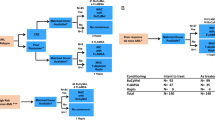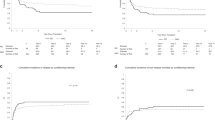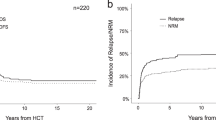Abstract
We randomized 3375 adults with newly diagnosed acute myeloid leukemia (AML) or high-risk myelodysplastic syndrome to test whether increasingly intensive chemotherapies assigned at study-entry and analyzed on an intent-to-treat basis improved outcomes. In total, 1529 subjects <60 years were randomized to receive: (1) a first course of induction therapy with high-dose cytarabine and mitoxantrone (HAM) or with standard-dose cytarabine, daunorubicin and 6-thioguanine (TAD) followed by a second course of HAM; (2) granulocyte-colony stimulating factor (G-CSF) or no G-CSF before induction and consolidation courses; and (3) high-dose therapy and an autotransplant or maintenance chemotherapy. In total, 1846 subjects ⩾60 years were randomized to receive: (1) a first induction course of HAM or TAD and second induction course of HAM (if they had bone marrow blasts ⩾5% after the first course); and (2) G-CSF or no G-CSF as above. Median follow-up was 7.4 years (range, 1 day to 14.7 years). Five-year event-free survivals (EFSs) for subjects receiving a first induction course of HAM vs TAD were 17% (95% confidence interval, 15, 18%) vs 16% (95% confidence interval 14, 18%; P=0.719). Five-year EFSs for subjects randomized to receive or not receive G-CSF were 19% (95% confidence interval 16, 21%) vs 16% (95% confidence interval 14, 19%; P=0.266). Five-year relapse-free survivals (RFSs) for subjects <60 years receiving an autotransplant vs maintenance therapy were 43% (95% confidence interval 40, 47%) vs 40 (95% confidence interval 35, 44%; P=0.535). Many subjects never achieved pre-specified landmarks and consequently did not receive their assigned therapies. These data indicate the limited impact of more intensive therapies on outcomes of adults with AML. Moreover, none of the more intensive therapies we tested improved 5-year EFS, RFS or any other outcomes.
This is a preview of subscription content, access via your institution
Access options
Subscribe to this journal
Receive 12 print issues and online access
$259.00 per year
only $21.58 per issue
Buy this article
- Purchase on Springer Link
- Instant access to full article PDF
Prices may be subject to local taxes which are calculated during checkout



Similar content being viewed by others
References
Büchner T, Berdel WE, Haferlach C, Haferlach T, Schnittger S, Müller-Tidow C et al. Age-related risk profile and chemotherapy dose response in acute myeloid leukemia: a study by the German Acute Myeloid Leukemia Cooperative Group. J Clin Oncol 2009; 27: 61–69.
Döhner H, Estey EH, Amadori S, Appelbaum FR, Büchner T, Burnett AK et al. Diagnosis and management of acute myeloid leukemia in adults: recommendations from an international expert panel, on behalf of the European LeukemiaNet. Blood 2010; 115: 453–474.
Büchner T, Schlenk RF, Schaich M, Döhner K, Krahl R, Krauter J et al. Acute Myeloid Leukemia (AML): different treatment strategies versus a common standard arm—combined prospective analysis by the German AML Intergroup. J Clin Oncol 2012; 30: 3604–3610.
Niederwieser D, Hoffmann VS, Krahl R, Berdel WE, Sauerland MC, Hiddemann W et al. Factors influencing complete remission (CR) rate in patients >= 60 years with acute myeloid leukemia (AML): report from the German AML Intergroup Study. Blood 2012; 120 (Suppl 21): S1 (abstract 128).
Cheson BD, Bennett JM, Kopecky KJ, Büchner T, Willman CL, Estey EH et al. Revised recommendations of the International Working Group for diagnosis, standardization of response criteria, treatment outcomes, and reporting standards for therapeutic trials in acute myeloid leukemia. J Clin Oncol 2003; 21: 4642–4649.
Stelljes M, Krug U, Beelen DW, Braess J, Sauerland MC, Heinecke A et al. Allogeneic transplantation versus chemotherapy as postremission therapy for acute myeloid leukemia: a prospective matched pairs analysis. J Clin Oncol 2014; 32: 288–296.
Bishop JF, Matthews JP, Young GA, Szer J, Gillett A, Joshua D et al. A randomized study of high-dose cytarabine in induction in acute myeloid leukemia. Blood 1996; 87: 1710–1717.
Weick JK, Kopecky KJ, Appelbaum FR, Head DR, Kingsbury LL, Balcerzak SP et al. A randomized investigation of high-dose versus standard-dose cytosine arabinoside with daunorubicin in patients with previously untreated acute myeloid leukemia: a Southwest Oncology Group study. Blood 1996; 88: 2841–2851.
Fernandez HF, Sun Z, Yao X, Litzow MR, Luger SM, Paietta EM et al. Anthracycline dose intensification in acute myeloid leukemia. N Engl J Med 2009; 361: 1249–1259.
Löwenberg B, Ossenkoppele GJ, van Putten W, Schouten HC, Graux C, Ferrant A et al. High-dose daunorubicin in older patients with acute myeloid leukemia. N Engl J Med 2009; 361: 1235–1248.
Röllig C, Kramer M, Gabrecht M, Hänel M, Herbst R, Kaiser U et al. Randomized Comparison of Intermediate-Dose Cytarabine Plus Mitoxantrone (IMA) Versus Standard-Dose Cytarabine Plus Daunorubicin (DA) for Induction Therapy in AML Patients >60 Years. Results from the SAL 60+ Trial. Blood 2015; 126 (Suppl 23): S1 (abstract 222).
Löwenberg B, van Putten W, Theobald M, Gmür J, Verdonck L, Sonneveld P et al. Effect of priming with granulocyte colony-stimulating factor on the outcome of chemotherapy for acute myeloid leukemia. N Engl J Med 2003; 349: 743–752.
Pabst T, Vellenga E, van Putten W, Schouten HC, Graux C, Vekemans MC et al. Favorable effect of priming with granulocyte colony-stimulating factor in remission induction of acute myeloid leukemia restricted to dose escalation of cytarabine. Blood 2012; 119: 5367–5373.
Gale RP, Wiernik PH, Lazarus HM . Should persons with acute myeloid leukemia have a transplant in first remission? Leukemia 2014; 28: 1949–1952.
Zittoun RA, Mandelli F, Willemze R, de Witte T, Labar B, Resegotti L et al. Autologous or allogeneic bone marrow transplantation compared with intensive chemotherapy in acute myelogenous leukemia. European Organization for Research and Treatment of Cancer (EORTC) and the Gruppo Italiano Malattie Ematologiche Maligne dell'Adulto (GIMEMA) Leukemia Cooperative Groups. N Engl J Med 1995; 332: 217–223.
Harousseau JL, Cahn JY, Pignon B, Witz F, Milpied N, Delain M et al. Comparison of autologous bone marrow transplantation and intensive chemotherapy as postremission therapy in adult acute myeloid leukemia. The Groupe Ouest Est Leucemies Aigues Myeloblastiques (GOELAM). Blood 1997; 90: 2978–2986.
Burnett AK, Goldstone AH, Stevens RM, Hann IM, Rees JK, Gray RG et al. Randomised comparison of addition of autologous bone-marrow transplantation to intensive chemotherapy for acute myeloid leukaemia in first remission: results of MRC AML 10 trial. UK Medical Research Council Adult and Children's Leukaemia Working Parties. Lancet 1998; 351: 700–708.
Cassileth PA, Harrington DP, Appelbaum FR, Lazarus HM, Rowe JM, Paietta E et al. Chemotherapy compared with autologous or allogeneic bone marrow transplantation in the management of acute myeloid leukemia in first remission. N Engl J Med 1998; 339: 1649–1656.
Tsimberidou AM, Stavroyianni N, Viniou N, Papaioannou M, Tiniakou M, Marinakis T et al. Comparison of allogeneic stem cell transplantation, high-dose cytarabine, and autologous peripheral stem cell transplantation as postremission treatment in patients with de novo acute myelogenous leukemia. Cancer 2003; 97: 1721–1231.
Vellenga E, van Putten W, Ossenkoppele GJ, Verdonck LF, Theobald M, Cornelissen JJ et al. Autologous peripheral blood stem cell transplantation for acute myeloid leukemia. Blood 2011; 118: 6037–6042.
Reiffers J, Gaspard MH, Maraninchi D, Michallet M, Marit G, Stoppa AM et al. Comparison of allogeneic or autologous bone marrow transplantation and chemotherapy in patients with acute myeloid leukaemia in first remission: a prospective controlled trial. Br J Haematol 1989; 72: 57–63.
Reiffers J, Stoppa AM, Attal M, Michallet M, Marit G, Blaise D et al. Allogeneic vs autologous stem cell transplantation vs chemotherapy in patients with acute myeloid leukemia in first remission: the BGMT 87 study. Leukemia 1996; 10: 1874–1882.
Breems DA, Boogaerts MA, Dekker AW, Van Putten WL, Sonneveld P, Huijgens PC et al. Autologous bone marrow transplantation as consolidation therapy in the treatment of adult patients under 60 years with acute myeloid leukaemia in first complete remission: a prospective randomized Dutch-Belgian Haemato-Oncology Co-operative Group (HOVON) and Swiss Group for Clinical Cancer Research (SAKK) trial. Br J Haematol 2005; 128: 59–65.
Pfirrmann M, Ehninger G, Thiede C, Bornhäuser M, Kramer M, Röllig C et al. Prediction of post-remission survival in acute myeloid leukaemia: a post-hoc analysis of the AML96 trial. Lancet Oncol 2012; 13: 207–214.
Acknowledgements
This study was funded by the Deutsche Krebshilfe (70-2839-Bü4). RPG acknowledges support from the National Institute of Health Research (NIHR) Biomedical Research Centre funding scheme. Professors Elihu Estey (University Washington) and Charles Schiffer (Wayne State University) kindly reviewed the typescript and provided helpful comments. The participating institutions are listed in the supplement.
Author information
Authors and Affiliations
Consortia
Corresponding author
Ethics declarations
Competing interests
The authors declare no conflict of interest.
Additional information
Supplementary Information accompanies this paper on the Leukemia website
Supplementary information
Rights and permissions
About this article
Cite this article
Krug, U., Berdel, W., Gale, R. et al. Increasing intensity of therapies assigned at diagnosis does not improve survival of adults with acute myeloid leukemia. Leukemia 30, 1230–1236 (2016). https://doi.org/10.1038/leu.2016.25
Received:
Revised:
Accepted:
Published:
Issue Date:
DOI: https://doi.org/10.1038/leu.2016.25
This article is cited by
-
Validation and refinement of the 2022 European LeukemiaNet genetic risk stratification of acute myeloid leukemia
Leukemia (2023)
-
Unsupervised meta-clustering identifies risk clusters in acute myeloid leukemia based on clinical and genetic profiles
Communications Medicine (2023)
-
Different treatment strategies versus a common standard arm (CSA) in patients with newly diagnosed AML over the age of 60 years: a randomized German inter-group study
Annals of Hematology (2023)
-
Identification and validation of a siglec-based and aging-related 9-gene signature for predicting prognosis in acute myeloid leukemia patients
BMC Bioinformatics (2022)
-
When dormancy fuels tumour relapse
Communications Biology (2021)



